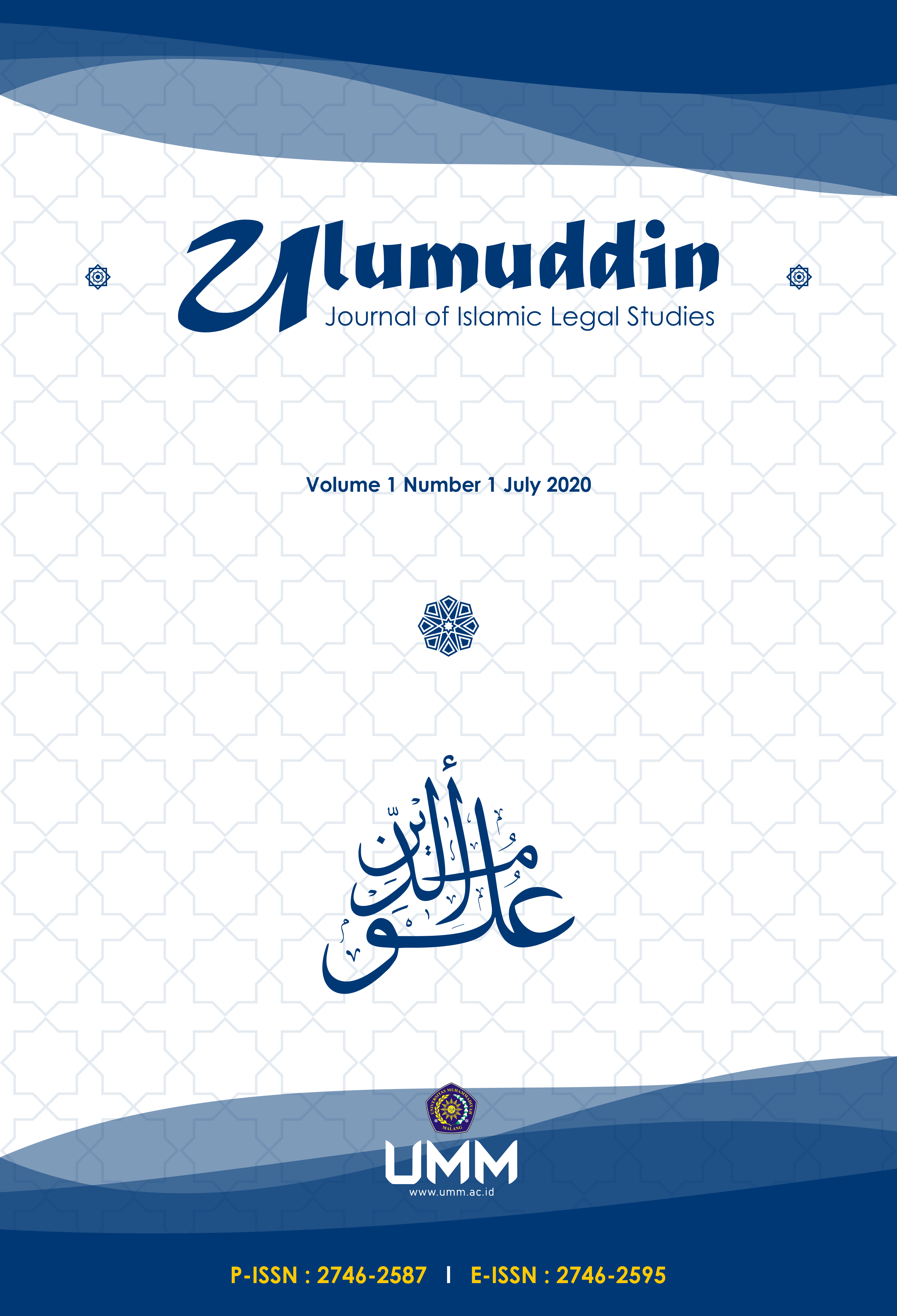The Shafi’i’s and the School of Shafi’ite’s (the Nawawi’s and Ramli’s) Concept of Kafā’ah
DOI:
https://doi.org/10.22219/ulumuddin.v1i1.12722Keywords:
Kafā’ah, Shafi’i, Shafi’ite, khiyār, Islamic marriage, disability in Islamic law, Imam Nawawi, Imam Ramli.Abstract
The harmonic household is viewed to be one of the ideals of marriage. The harmony is possible to gain when the couple have achieved the principles of kafā’ah covering the matters of education, economy, social status and morals. In dealing with the issue of kafā’ah, however, the scripture (al-Qur’ān and Sunnah) has no mentioned any specific regulation of it. Consequently, it tends to urge the emergence of various Islamic legal methods in order to invent the legal status of the issue. The primary literatures have depicted similarities among the Muslim jurists’ view (Shafi’i, Nawawi and Ramli) in formulating the criteria of kafā’ah in marriage, although they have remained differences. This article purposes to examine the literatures and identify the factors influence the formation of the concept, and also consider the acceleration of it in the development of the Shafi’i and Shafi’ite legal thought. This article argues that the similarities involve the theme of pedigree, religion and wealth in kafā’ah, while the differences cover the matters of the physical disability as one of the requirements and rights (khiyār) in terms of transaction. It has been fundamentally influenced by the social, cultural and geographic factors, and the intellectual capacity and capability of the legal scholars.
Downloads
References
Al-‘Aẓim, Abu al-Tayyib al-Siddiqi. ‘Aun al-Ma'būd Sharh Sunan Abi Dawud, Vol. 4. Beirut: Dār al-Fikr, 1979.
Abbas, Sirajuddin. Sejarah dan Keagungan Madzab Shafi’i. Jakarta: Pustaka Tarbiyah, 1994.
Adlim, Muhammad Fauzil and Muhammad Nazhif Masykur. Di Ambang Pernikahan. Jakarta: Gema Insani Press, 2002.
Aziz, Dahlan Abdul. Ensiklopedi Hukum Islam. Jakarta: PT. Ichtiar van Houve, 1999.
Bravmann, M.M.. The Spiritual Background of Early Islam. Leiden: E.J. Brill, 1972.
Al-Dimyati, Abu Bakar. I’ānat al-Ṭālibīn, Vol. 3. Semarang: Toha Putra, 1993.
Fattah, Nurul. “Hukum Pernikahan Syarifah dengan Laki-Laki Nonsayyid: Perspektif Jam‘iyyah Rabithah Alawiyyah Yogyakarta.” Jurnal Al-Ahwal 6, no. 2 (2013): 129-143. http://ejournal.uin-suka.ac.id/syariah/Ahwal/article/view/1093
Al-Haitami, Ibn Hajar. Mablagh al-‘Arab fī Fakhr al-‘Arab. Beirut: Dār al-Kutub al-‘Ilmiyah, Nd.
Al-Hibri, Azizah. “The Nature of the Islamic Marriage: Sacramental, Covenantal, or Contractual?” In The Covenant Marriage in Comparative Perspective, edited by John Witte Jr. and Eliza Ellison, 182-216. Cambridge: William B. Ee R, 2005.
Huda, Sigma. “Report of the Special Rapporteur on the Human Rights Aspects of the Victims of Trafficking in Persons, Especially Women and Children 2007.” United Nations.https://documents-dds-ny.un.org/doc/UNDOC/GEN/G07/104/10/PDF/G0710410.pdf?OpenElement.
Jamal. “Pergeseran Konsep Kufu’ menurut Masyarakat Keturunan Arab.” Ulumuddin 1, no. 1 (2018): 1-30.
Al-Jaziri, Abdur Rahman. Al-Fiqh ‘ala Maḍahib al-Arbā’ah. Lebanon: Dār al-Kutub, 2010.
Al-Jurzani. Al-Ta’rifāt. Beirut: Dār al-Kutub al-‘Ilmiyah, 1988.
Komnas Perempuan. Catatan Kekerasan Terhadap Perempuan Tahun 2017 (Catahu KOMNAS Perempuan tahun 2018). Jakarta: Komnas Perempuan, 2018.
Ma’luf, Louis. Munjīd fī al-Lughah wa al-A‘lām. Beirut: Dār al-Mashriq, 1976.
Mahfud, Sahal. Ahkamul Fuqaha: Solusi Problematika Aktual Hukum Islam, Keputusan Muktamar, Munas dan Kombes Nahdlatul Ulama (1926-1999 M). Surabaya: Lajnah Ta’lif wan Nasyar Nahdhatul Ulama, 2011.
Al-Misri, Ahmad ibn Lu’lu’ Naqib. Reliance of the Traveller. Translated by Nuh Ha Mim Keller. Beltsville: Amana Publications, 1997.
Mughal, Munir Ahmad. Hadrat Bilal. Monthly Islamic Literature, 1 Juli 1969.
Muhammad, Abu al-Fadl Jamal al-Din. Lisān al-Arab. Beirut: Dār al-Fikr, 1990.
Musa, Muhammad Yusuf. Aḥkām al-Ahwāl al-Shakhsiyyah fī al-Islām. Cairo: Dār al-Kutub al-‘Arabi, 1956.
Nasution, Khoiruddin. Islam tentang Relasi Suami dan Istri (Hukum Perkawinan I). Yogyakarta: Academia Tazzafa, 2004.
Al-Nawawi, Abu Zakariyya Yahya ibn Sharf. Al-Majmu’, Vol. 17. Beirut: Dār al-Fikr, 2000.
Al-Nawawi, Abu Zakariyya Yahya ibn Sharf. Raudat al-Ṭālibin, Vol. 5. Beirut: Dār al-Kutub al-Ilmiyah, 1992.
Noor, Nazariah and Nazirah Lee. “The Conflict among Hadrami Arab Community in Malaysia Regarding the Issues of Kafā’a in Muslim Marriage.” Journal of Women of the Middle East and the Islamic World11, no. 2-3 (2014): 252-274. DOI: https://doi.org/10.1163/15692086-12341249
Nur, Iffatin. “Pembaharuan Konsep Kesepadanan Kualitas (Kafaa’ah) dalam Al-Qur’an dan Hadis.” Jurnal Kalam 6, no. 2 (2012): 411-436. DOI: https://doi.org/10.24042/klm.v6i2.413
Al-Ramli, Syamsuddin Muhammad ibn Abi al-Abbas. Nihāyah al-Muḥtāj ilā Sharh al-Minhāj, Vol. 6. Lebanon: Dār al-Kutub al-‘Ilmiyah, Nd.
Sahnun. Al-Mudawwanah al-Kubrā, Vol. 3. Cairo: Dār al-Sadr, 1323 H.
Salim, Abu malik Kamal ibn As-Sayyid. Fiqih Sunnah Wanita. Translated by Agus Faisal Karim. Depok: Madina Pustaka, 2011.
Samin, Nadav. “Kafāʾa fī l-Nasab in Saudi Arabia: Islamic Law, Tribal Custom, and Social Change.” Journal of Arabian Studies 2, no. 2 (2012): 109-126. DOI: https://doi.org/10.1080/21534764.2012.735456
Al-Sayyis, Muhammad Ali. Sejarah Fiqih Islam. Jakarta: Pustaka al-Kautsar, 2003.
Al-Sha’rani, Abd al-Wahab. Al-Mīzān al-Kubrā, Vol. 1. Beirut: Dār al-Fikr, Nd.
Al-Shafi’i, Abi Abdillah Muhammad ibn Idris. Al-Umm, Vol. 5. Beirut: Dār al-Kutub al-‘Ilmiyah, 1993.
Al-Shan’ani. Subul al-Salām, Vol. 3. Cairo: Maktābah Mustafā al-Bābi al-Halābi, 1950.
Syukrawati. “Urgensi Kafā’ah dalam Perkawinan serta Kaitannya dengan Pola Hubungan Suami Istri dalam Perbedaan Status Sosial (Studi pada Dosen IAIN Kerinci).” Jurnal Islamika: Jurnal Ilmu-Ilmu Keislaman 17, no. 2 (2017): 97-120. https://ejournal.iainkerinci.ac.id/index.php/islamika/article/view/209
Al-Tirmidhi, Abu ‘Isa Muhammad ibn ‘Isa. Sunan al-Tirmidhi. Beirut: Dār al-Fikr, 1999.
Yanggo, Huzaemah Tahido. Pengantar Perbandingan Mazhab. Jakarta: Penerbit Logos, 1997.
Zadah, Ali. Sharh Shir’ah al-Islam. Beirut: Dār al-Kutub al-‘Ilmiyah, Nd.
Zahra, Muhammad Abu. Imam Syafi’i: Biografi dan Pemikirannya dalam Masalah Akidah, Politik dan Fiqih. Jakarta: PT Lentera Basritama, 2005.
Zahrah, Muhammad Abu. Al-Ahwāl al-Shakhsiyyah. Cairo: Dār al-Fikr wa al-‘Arabi, 1950.
Zuhaili, Wahbah. Fiqih Imam Syafi’i. Jakarta: Penerbit Almahira, 2010.
Zuhayli, Wahbah. Uṣūl al-Fiqh al-Islâmi, Vol. 2. Damascus: Dār al-Fikr, 1986
Downloads
Published
How to Cite
Issue
Section
License
Copyright (c) 2020 Ulumuddin

This work is licensed under a Creative Commons Attribution-ShareAlike 4.0 International License.



















